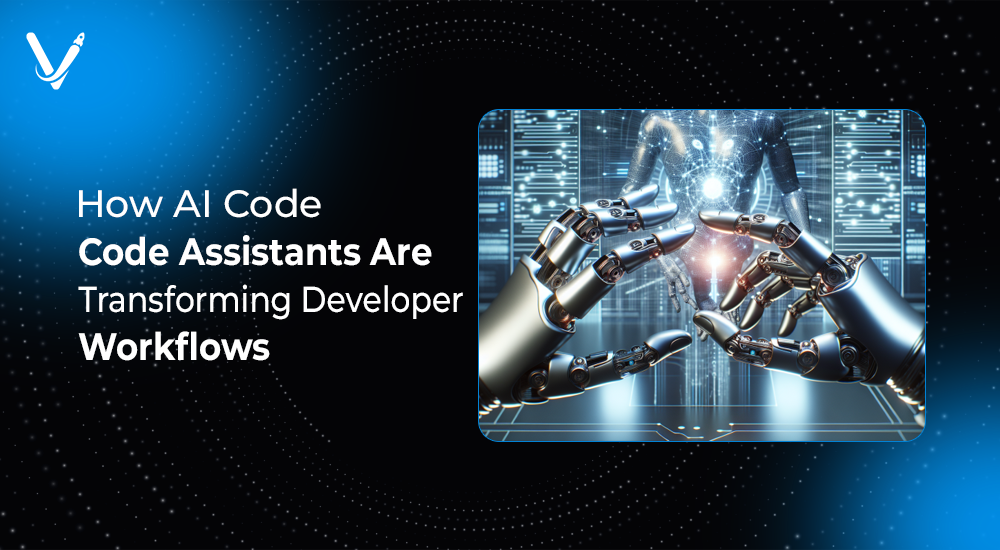How AI Code Assistants Are Transforming Developer Workflows


- Aug 7, 2025
Software development has always been an evolving landscape, but the recent leap powered by AI is unlike anything before. Developers are no longer bound solely to human reasoning or static tools. With the rise of AI code assistants, programmers across industries are discovering faster, smarter, and more collaborative ways to write, debug, review, and deploy code.
These intelligent assistants are not just productivity tools—they're reshaping how development itself is approached. This article dives deep into the role of AI-powered code assistants in modern software engineering, how they integrate into everyday workflows, the platforms leading this change, and what it means for the future of developers worldwide.
Whether you're writing your first "Hello World" or deploying enterprise-level microservices, understanding this shift is crucial to staying competitive and creative.
AI code assistants are software tools powered by machine learning modelssoftware trained on massive codebases. Their purpose is to assist developers with tasks like:
Unlike static IDE features, these assistants learn and improve based on context, user interaction, and even team patterns.
Most AI code assistants rely on large language models (LLMs) trained specifically on programming languages, documentation, and software best practices. They analyze:
With this data, they generate suggestions, solutions, or even entire modules, customized for the task at hand.
Before AI entered the developer toolkit, coders often:
While many productivity tools existed, they were reactive—not predictive.
With tight deadlines, increasing code complexity, and growing collaboration needs, traditional workflows were becoming bottlenecks.
AI code assistants solve this by acting as:
Developers often write similar patterns repeatedly. AI assistants can:
This helps coders focus on logic and architecture rather than syntax.
Instead of waiting for runtime errors or failed test cases, AI assistants:
Some tools even run simulated environments in the background to test snippets in real time.
Reading someone else's code—or your own after six months—can be daunting. AI assistants help by:
This enhances maintainability and collaboration across teams.
Need to convert a Python module into Go? Or write an SQL query based on business logic? AI code assistants:
This is especially useful in polyglot environments and full-stack teams.
AI tools can create:
With robust testing being essential in CI/CD pipelines, this is a game-changer.
The best AI assistants don’t just offer generic help—they learn your project. They:
Developed by GitHub and OpenAI, Copilot integrates directly into VS Code and popular IDEs. Key features include:
GitHub claims that Copilot writes nearly 46% of code in supported languages for developers using it regularly.
This AWS offering focuses on secure and enterprise-level coding. Highlights include:
Its compliance with corporate governance makes it ideal for enterprise adoption.
Tabnine uses multiple language models trained on open-source code. Its features:
Codeium offers a free and fast AI assistant with:
It’s popular among startups and indie devs due to its affordability and simplicity.
A fintech startup building an API-driven payment platform used Copilot during its MVP phase. With a two-person team, they:
By shipping faster, they secured early-stage funding in just 3 months.
A global logistics firm integrated Amazon CodeWhisperer into its internal ERP platform. The AI assistant:
This improved both security posture and developer velocity.
Open-source maintainers often face the burden of documenting and reviewing large volumes of pull requests. With AI help:
AI suggestions appear as you type—no tab switching or waiting. Integration with tools like VS Code, JetBrains, and Neovim makes onboarding seamless.
AI can assist in:
This streamlines code collaboration across teams.
Tools like Mintlify and Swimm leverage AI to auto-generate onboarding docs or architecture guides based on your repo.
AI can suggest infrastructure as code (IaC) templates, auto-generate YAML for CI/CD, and validate Dockerfiles or Kubernetes manifests.
Not all AI suggestions are accurate. Developers must:
AI assistants trained on public codebases may generate snippets with unclear licenses. Be aware of:
Sharing sensitive codebases with cloud-based assistants can be risky. Choose tools that:
Will AI replace developers? Not likely. But roles will evolve:
The key is to see AI as augmentation—not automation.
Use AI for low-risk areas first:
Share AI-generated snippets in Slack or PRs for team-wide improvement. Discuss what works, what doesn’t, and create standards.
Future AI assistants will:
Imagine discussing your backlog with an assistant:
These assistants will be voice- or chat-based, integrated with tools like Jira, GitHub, and Figma.
Assistants will suggest not only code but infrastructure and deployment pipelines. GitHub Copilot for DevOps is already in the works.
AI will enable:
The result: a more empowered and self-driven developer ecosystem.
AI code assistants are not here to replace developers—they're here to elevate them. By offloading repetitive work, catching bugs early, and generating faster insights, these tools make development smoother, faster, and more creative.
Whether you're a freelancer, a startup founder, or part of an enterprise team, adopting AI in your development workflow isn't just about staying ahead—it's about thriving in a new era of software engineering.
At Vasundhara Infotech, we help businesses harness the full potential of AI in app and software development. From integrating intelligent assistants into your dev stack to building AI-native platforms, our team is your partner in innovation.
Let’s build smarter—together. Get in touch with us.
Copyright © 2026 Vasundhara Infotech. All Rights Reserved.
